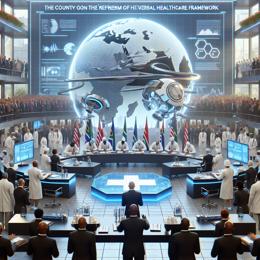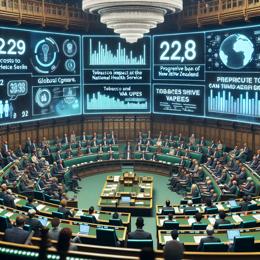Image created by AI
Controversial Shift in US Health Policy as RFK Jr. Takes Helm at HHS
In a significant and contentious shake-up of U.S. health policy, Robert F. Kennedy Jr. was officially sworn in as the Secretary of the Department of Health and Human Services this Thursday. Appointed by President Donald Trump and narrowly confirmed by the Senate in a 52-48 vote, Kennedy assumed office amidst polarizing views concerning his stance on public health issues, particularly vaccinations and food safety standards.
The ceremony, held in the Oval Office and officiated by Supreme Court Justice Neil Gorsuch, marks a new chapter for the department that will likely see substantial shifts in health governance. Kennedy, a former Democrat turned third-party advocate, has been a vocal critic of conventional vaccine policies—a point that dominated the contentious confirmation hearings. Despite the skepticism, Trump has lauded Kennedy as "a fierce advocate for the health of our children," and has inaugurated a commission to probe the escalating rates of chronic illnesses under Kennedy's suggestion.
The appointment was not without its dissenters, as Mitch McConnell, Kentucky's former Senate majority leader and a polio survivor emphasized, "I will not condone the re-litigation of proven cures." His remarks echo the widespread concerns of both public health experts and several political figures regarding Kennedy's controversial views on vaccines.
Despite assurances given during Senate hearings where Kennedy promised not to overhaul the Advisory Committee on Immunization Practices at CDC, critics remain wary. Democratic Senator Elizabeth Warren remarked that his confirmation was a “huge mistake,” pointing out the potential for a resurgence of diseases preventable by vaccines under his leadership.
One of Kennedy's pledges includes the elimination of artificial food dyes from the American food supply, a campaign that aligns with his broader environmental health crusade. His stance has won him the backing of groups skeptical of mainstream scientific outlooks on both vaccines and food safety, reflecting a clear division among the populace on these critical health issues.
Kennedy’s role also extends to the supervision of agencies like the Food and Drug Administration (FDA) and influential public health recommendations made by the Centers for Disease Control and Prevention (CDC). With such agencies under his influence, Kennedy's decisions are poised to impact a broad swath of America's healthcare landscape, from the approval of new medical treatments to federal insurance programs for the elderly and economically disadvantaged populations.
Despite these potential changes, Kennedy has promised to consult stakeholders such as Senator Bill Cassidy, a physician and chairman of the Health, Education, Labor and Pensions Committee, in significant policy shifts, notably in public vaccine guidance.
As Kennedy vows to combat the chronic disease epidemic in America, his term as head of HHS will undoubtedly be closely monitored by supporters and opponents alike, promising a highly charged and perhaps transformative period in U.S. health policy.










